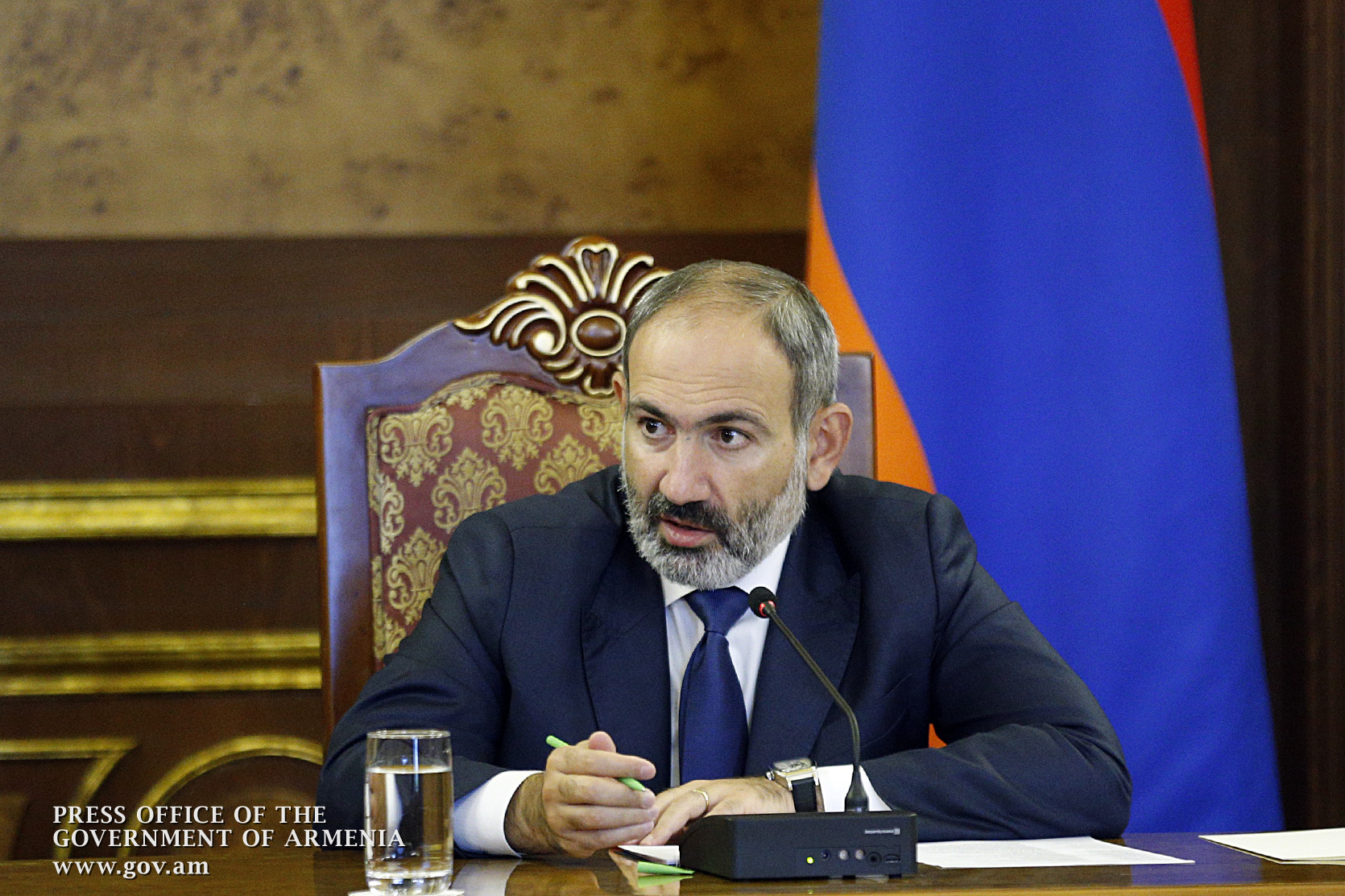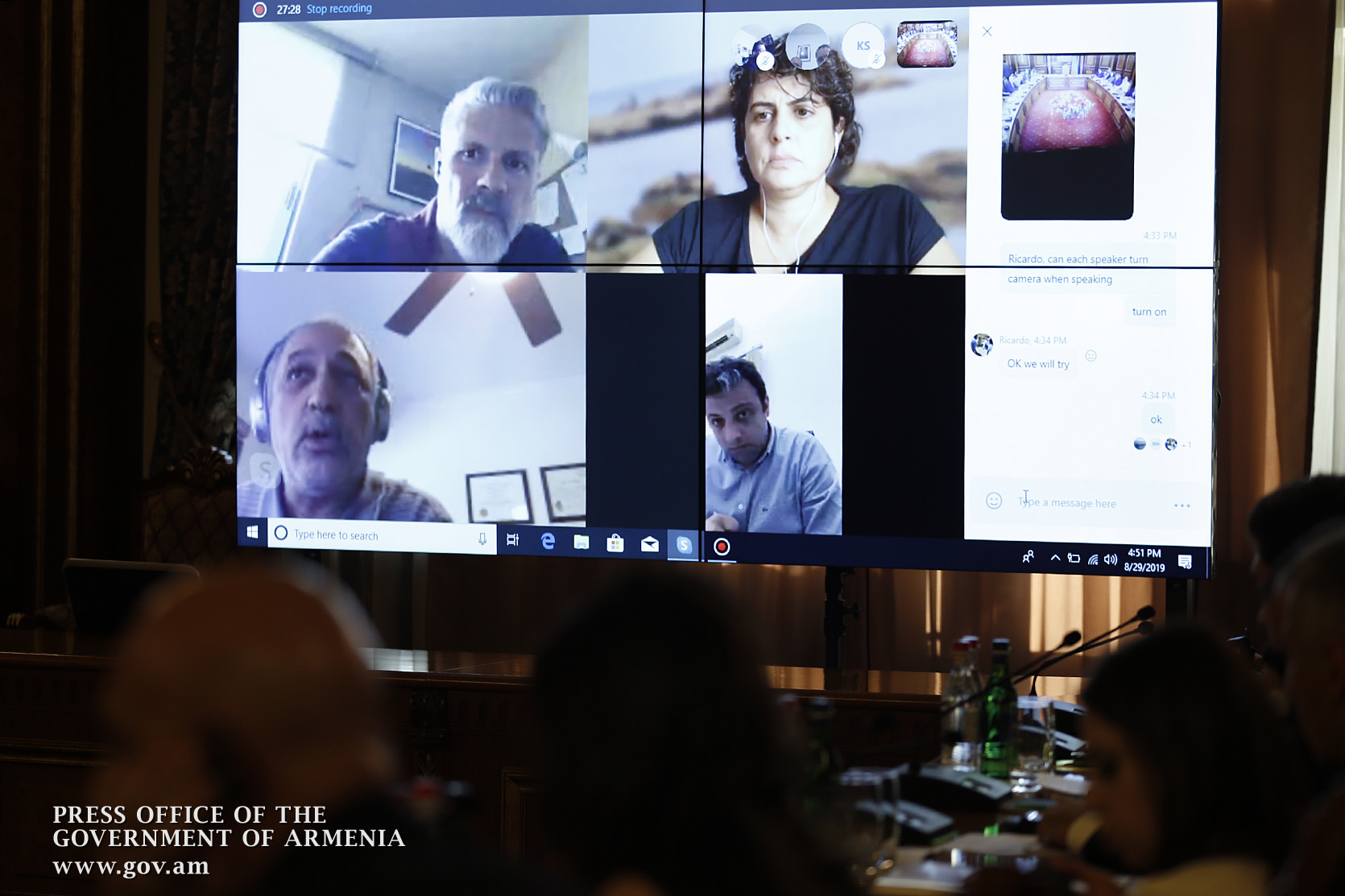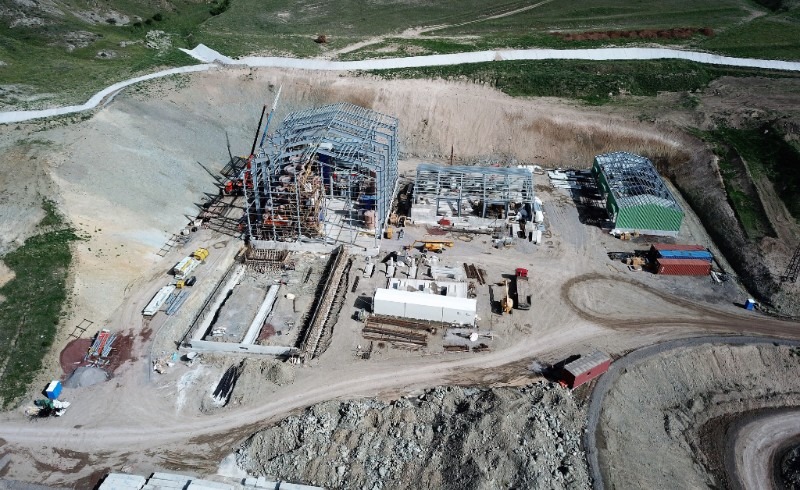
YEREVAN—The Armenian government has yet again postponed any ruling on the safety of the controversial Amulsar gold mine. At a cabinet meeting on Wednesday, Minister of Environmental Protection Eric Grigoryan briefed the Prime Minister on his Ministry’s ongoing review of the latest environmental impact assessment (EIA) submitted by the Lebanese consultancy firm ELARD in late July.
The Minister of Nature Protection was expected to deliver a judgement today on whether a fourth independent environmental impact study on the Amulsar mining site would be necessary following a hearing with ELARD executives last Friday. However, the Armenian Academy of Sciences, which had been requested to evaluate the report issued a statement on the morning of the expected ruling. The statement read: “We must inform [Minister Grigoryan] that it is not possible to provide a complete scientific evaluation to the Amulsar project within the prescribed period given the large volume of project documentation and the wide range of issues.”
The Prime Minister then requested that the representatives of the agencies present at the meeting coordinate their efforts to provide a comprehensive analysis with complete data on the investigation. No new date for a ruling was announced, however.
On Friday, government officials held a hearing with experts from the Lebanese consulting group ELARD to shed light on some contentious questions surrounding the firm’s EIA on the mining site. A summary of the EIA’s findings published several weeks earlier by the Armenian Investigative Committee reported that the study had ruled out any danger of contamination from the mine to Lake Sevan or the Jermuk water springs and offered 16 measures to eliminate any risk of contamination to surrounding waterways. However, the references to ‘incomplete data’ and ‘flaws’ peppered throughout the final published report have caused much confusion over the conclusions, methodology and even the mandate of ELARD’s assessment.

During the two and a half hour video-call, Prime Minister Nikol Pashinyan asked ELARD experts to confirm whether he had correctly understood the report’s conclusions. “Having reviewed your findings,” the Prime Minister asked, “am I correct in interpreting your assessment as concluding that the Amulsar mine poses no threat to Lake Sevan and Jermuk, while manageable risks to surrounding water sources can be eliminated with your proposed measures?”
Hydrogeologist Dr. Nidal Rabah confirmed the Prime Minister’s interpretation, stressing the need for their “proposed measures being strictly implemented and properly monitored.” ELARD managing partner Ricardo Khoury quickly interjected, adding that the firm’s proposed mitigation measures were formulated in spite of ‘incomplete’ and ‘flawed’ data provided by Lydian Armenia. Khoury suggested that yet another EIA might be necessary once these measures are implemented.
This revelation briefly stunned the Prime Minister who asked why they would provide a solution to a problem without the supporting data. “This was requested by your government,” Khoury replied. This was confirmed by the Investigative Committee’s Yura Ivanyan, who also produced an email detailing the exchange.
Ivanyan’s leadership of the criminal probe into the Amulsar case has attracted controversy following a report by the Armenian news site Infocom revealing that he is distantly related to Aramayis Grigoryan, the former Minister of Nature Protection who oversaw the initial deal with Lydian.
The ex-minister didn’t deny this claim but dismissed the possibility of any conflict of interest. “Yes, we are distantly related, so what?” expressed Grigoryan. “The initial exploration contract was approved back in 2014, while the latest environmental impact study was conducted in 2016.” Grigoryan had been succeeded as Minister by Artsvik Minasyan by that time. Regardless, the Investigative Committee has launched an internal probe into Ivanyan’s activities.
Khoury’s characterization of ‘flawed’ modeling at the mining site drew the ire of Lydian’s deputy head of sustainable development Armen Stepanyan, who insisted that they had fully cooperated with the investigation and committed to implementing all the suggested measures. In the ensuing spat, Dr Nidal replied: “I appreciate the fact that you are ready to ensure compliance […] but I must disagree that you have followed all necessary actions according to standard protocols.” Dr. Nidal refused to respond to a follow-up question from Stepanyan to list specifically which standard protocols or Armenian laws were violated.
The Lebanese experts were also unable to explain to the Prime Minister why their report had not taken into account the fact that Lydian had already been in the process of implementing 10 out of their 16 proposed mitigation measures, as confirmed by the Investigative Committee.
Hayk Grigoryan, Chairman of the Investigative Committee, explained to the panel that Lydian had successfully refuted some of those conclusions through laboratory testing. Dr. Rabah acknowledged that Lydian’s demonstration met international standards, but argued that results from controlled lab testing are not necessarily replicable in the field.
Following the meeting, Pashinyan wrote on Facebook that the hearing brought to light “a number of new circumstances which require investigation and evaluation.” Minister Grigoryan confirmed to the Prime Minister that the hearing had provided him with enough information to determine the necessity of a further EIA – which he was expected to announce on Wednesday.
In response, Lydian issued a damning press release criticizing the ELARD experts’ interpretation of flawed data as “misleading.” The statement blasted the consultants’ reluctance to specify the industry standards and legal framework upon which they determined these flaws. The communiqué also explicitly referred to the existence of special interests, in the form of rival mining companies, behind the endless delays in the government’s ruling. This claim had been alluded to by Pashinyan in the past, and some evidence has surfaced to suggest that at least some of the environmentalist activists had received material support from the Zangezur Copper and Molybdenum Combine, as well as Republican party-affiliated businessman Ashot Arsenyan, who owns the Jermuk Group LLC.
The American Chamber of Commerce in Armenia also came out in Lydian’s defense this week. In an open letter, the Chamber’s signatories warned the Armenian Prime Minister that Lydian’s “unfair treatment” doesn’t bode well in terms of attracting new foreign investment to Armenia. “AmCham truly recognizes the importance of professional and impartial audits in the mining sector, still, regrets that Lydian’s Amulsar project has been the only project so far that was pressured to undergo three consecutive audits while the roads to the project remain illegally blocked for over a year now.”
Controversy over the mine began in 2012 when Lydian International LTD signed a concession agreement with the Armenian government for the rights to exploit the gold deposits at Amulsar. The company has poured almost $400 million into the project, which is expected to generate some $500 million in tax revenue for Armenia and create 1300 jobs over its lifetime.
Environmentalists have long campaigned against the project, arguing that the acid mine drainage and the cyanide-based explosives used in the mine would contaminate Lake Sevan and Jermuk, as well as pollute surrounding communities. Critics have also cast doubt on the legality of the contract given the previous government’s reputation for making shady deals.
Lydian maintains that its operations meet the strictest internationally established environmental standards. The Anglo-Canadian company has worked with internationally renowned engineering firms Wardell Armstrong International, Golder Associates, Environmental Resources Management, Global Resource Engineering and Treweek Environmental Consultants to ensure compliance during the mine’s construction. The International Finance Corporation (IFC) and the European Bank of Reconstruction and Development (EBRD) have both concluded that the Amulsar mine meets their required environmental standards before financially backing the project. The EBRD also conducts yearly environmental audits on the mine.

The mining site, which was scheduled to launch operations in September of last year, has been blocked by environmentalists since last June. The mining firm has continued to cooperate with authorities throughout their investigation into the matter despite objecting to their legal basis. The company has also won a number of criminal and civil suits against some of the blockaders. The company’s Canadian and British subsidiaries have already filed international arbitration requests against Armenia but stopped short of proceeding with litigation so far.
As part of the Investigative Committee’s ongoing investigation, ELARD won a government tender to review the results of the previous two environmental impact assessments on the mining site and determine whether the site could be operated in accordance with Armenia’s environmental regulations. On Friday, the ELARD experts refused to decisively conclude whether the mine was ecologically safe to operate – despite that being an explicit request in their mandate at a cost of $400,000 to taxpayers—suggesting that yet another EIA would be required to make that call.
“It is not up to us to call for another environmental impact study,” Khoury told the Prime Minister on Friday, “but if you do feel it is necessary, we’ll be happy to conduct it”.


Hi, Raffi…it seems that the Armenian Government has areal problem to differentiate
between facts & an honest Canadian company who is giving the country a wonderful opportunity to earn a lot of money, tons of jobs and honest evaluations about the environmental problems they allowed in their past mining history.
Do they not trust an honest Canadian company who will create many jobs & tons of income for the country over the next 10-15 years.
Yeah I heard of an honest Canadian company once, it was called AS_IF INC :)
Have you heard of SNC Lavalin?
Speak with the Aboriginals for Canada living in the North who’s right are being violated by the oil companies.
Honest Canadian company, hahahaa… you made my day.
It pays to have politeness as ones facade, you can get away with anything, apparently.
Excuse me, but who are you to qualify the Canadian company as HONEST. I am not saying they are, and I am not saying they are not. It’s just beyond my understanding, as to what your credentials are to, so positively assert the honesty of that company.
As to the potential benefits to Armenia, I was stunned to read that Armenia would get the equivalent of ONLY $500 millions tax revenue over the LIFETIME of the project, while I guess the company would make billions and billions.
That $500 million would be a fraction of what it would actually cost Armenia to clean up the mess left out at the end of the project, on the mining site, besides the collateral potential environmental damages to the surrounding, as well as the lost revenues from all kinds of missed other business activities, in the domains of tourism, agriculture, and possibly more.
You show me one example of clean open mining in the world, that hasn’t left a messy and expensive clean up and environmental or health problems, and I will be the first and best promoter of this project.
Respectfully,
Henry
Are you an investor in that honest offshore company?
Roger Baker,
here is a link for you telling about how Canadian mining company Barrick Gold does business. And, what’s up with everyone from abroad taking Armenians for naive people, who can be easily manipulated and intimidated, talking to us as if we are children? Will you stop that, please?
https://www.nationalobserver.com/2016/06/24/news/canadian-mining-giant-barrick-gold-fired-whistleblower-then-they-spilled-cyanide?fbclid=IwAR3XPkMKCwQ-A8DlozmYU_pySL8ka–MA9yEpR0N-i2MbFo18aH1k3wIo_8
Unfortunately what appears to be acceptable for the Canadian government, the EBRD, the World Bank, Wardell Armstrong and Golder and Associates, apparently is not enough for ELARD.
For the record I’ve been in the mining industry for 20 years and have never heard of ELARD.
I’ve never heard of this company either and am also quite familiar with mining and consultants. Their website touts themselves as world-class consultants, but is peppered with typos and is written in poor English…some real world-class. It begs the question, why did they select this consultant no one’s heard of. The prime minister said it was recommended by the National Resource Governance Institute, which is a…Soros/Open Society organization, who seems to be the unofficial consultant for all things for the government.
Hrach, and have you heard of Lydian? I mean, before it decided to make this investment. This is a company with absolutely zero experience in mining and, I believe, anything at all. It was formed with the purpose of doing mining in Armenia and Georgia. They have been kicked out of Gerogia, I heard.
So with your 20-year experience in the area, you would be fine with this inexperienced offshore company, with lots of holes in their sloppy paperwork about the risks involved etc., who made the deal with a corrupt government, to come and mine in Armenia, contaminate our waters and all the rest? Your name tells me you are Armenian. Wow. You really care about the survival of your own people on the last remaining piece of our homeland. No words. Just get lost. Nobody cares for your poisonous investments.
Hello,
I have also not heard about ELARD and we have implemented many project under canadian companies with 0 harm. They are very good at mining in all aspects.
No problem, then go mine in your country and don’t tell us what to do. The people of Armenia don’t want it, end of story.
To Keke Amed, and all the proponents of the project,
maybe we do not live in the same Canada, or we do not follow the same news about the canadian mines and companies.
How come you haven’t heard about corrupt companies, fake studies, messy and failed operations in Latin America, savage exploitations elsewhere in the world.
Certainly not all Canadian mining companies are bad. But I wonder how you have not heard about the bad ones.
What i want to mean is that, the fact that the company is Canadian does not necessarily preclude negative results or impacts.
Unfortunately the clean up, and the environmental restitution costs are never taken into account in the exploitation of a mine, and naturally in the price of the end products. otherwise mining would be too prohibitive.
so we think short term, and when comes time to repair the damage, the suspects, and responsible always vanish or escape their responsibilities.
Honest Canadian company? Why don’t you publish the list of shareholders that stand to make millions from this project. They wouldn’t give a shit about poisoning the water basin.
Bunch of trolls trying to sway public opinion, eh?
This has become a very complex problem which will eventually become a legal problem.
I’ll let legal experts/pundits comment.
– No further study/analysis will be 100% conclusive.
– No agreement will be reached between the sides.
– No Mining project anywhere in the world is 100% risk free.
– It is a question of risk assessment versus benefits (if really meaningful).
– No iron clad guarantee can be made about risks caused by mother nature.
– Environmentalists demand 0 % risk, which in the real world is impractical.
-Lydian is a high risk company.
a) It is in a precarious financial condition.
b) It has negative cash flow , and it’s cash on hand as of 6.30.2019 as per their financial statements is a mere $ 5.8 million. They will need to raise cash soon which will be very difficult.
c) It’s equity is negative $ 23.7 million.
These are consequences of the blockade and work stoppage. They did not have the capacity/cushion to withstand such a prolonged period of stoppage.
It is desperate; it’s stock LDY ( on the Toronto exchange) is practically worthless.
Vart Adjemian
Being an Armenian, born and raised in Canada and now living in the USA. There is nothing more honest and trustworthy than Mother Armenia who for thousands of years has looked over the lands of Armenia. Destroying the lands is not an option for any Armenian. Lake Sevan saved the Armenian people during the blockade by to mention that the water that flows in the ground of Armenia feeds an entire nation what is arguably the best tasting fruits and vegetables on earth. Today’s greed should not be sold at the cost of the future of Armenia.